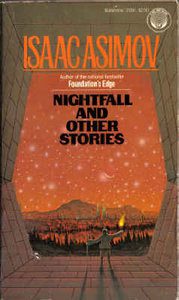Title: Nightfall and Other Stories
Author: Isaac Asimov
First published January 1, 1969
350 pages, Mass Market Paperback
ISBN: 9780345310910 (ISBN10: 0345310918)
Rating: 4.27
Overview
Isaac Asimov, the master of science fiction, presents a collection of his twenty classic short stories in Nightfall and Other Stories. Arranged in order of publication from 1941 to 1967, each story is introduced by Asimov himself.
The book opens with the most famous of them all, “Nightfall,” the story of a world suddenly plunged into darkness and madness. Asimov’s breakout piece, “Nightfall,” was so impactful that it was voted the best science-fiction short story ever written.
The other stories in the collection are just as thrilling and imaginative, including a love potion concocted by a dedicated scientist, machines that rebel against their creators, and a mysterious psychological virus that threatens humanity. These stories and more will transport you to new worlds and challenge your imagination.
About the Author
Isaac Asimov was a highly successful American author and professor of biochemistry, born in Russia. He is renowned for his works of science fiction and popular science books.
As a writer, he was incredibly prolific, having written or edited over 500 books and an estimated 90,000 letters and postcards. His works have been published in nine of the ten major categories of the Dewey Decimal System, which is quite an achievement.
Asimov is considered to be one of the most accomplished science fiction writers of all time, alongside Arthur C. Clarke and Robert A.
Heinlein. He was part of the “Big Three” science fiction writers of his time.
His most famous work is the Foundation Series, and he also wrote the Galactic Empire series and the Robot series. He even created a unified “future history” for his stories, much like those produced by Cordwainer Smith and Poul Anderson.
Asimov wrote numerous short stories, including “Nightfall,” which was voted the best short science fiction story of all time in 1964. He also penned mysteries and fantasy, as well as a great deal of nonfiction.
As a science writer, he often explained scientific concepts in a historical way, with dates and nationalities of scientists, etymologies, and pronunciation guides for technical terms.
Asimov was Vice President of Mensa International, although he was reluctant to be associated with the organization. He found some members to be “brain-proud and aggressive about their IQs.” He was President of the American Humanist Association, which gave him more joy.
Asimov was honored by having an asteroid, a magazine, a Brooklyn elementary school, and two different awards named after him.
Editoral Review
Isaac Asimov’s Nightfall and Other Stories is a timeless classic that has enthralled readers since its original publication in 1969. Asimov is a prolific writer and a giant of science fiction, known for his imaginative stories and technical acumen.
This collection of short stories demonstrates Asimov’s mastery of the genre, showcasing his ability to create richly textured worlds and complex characters that resonate with readers. Nightfall and Other Stories consists of eight short stories, each one exploring different themes and questions about humanity’s place in the universe.
The titular story, “Nightfall,” is a masterpiece of science fiction, exploring what happens when an ancient civilization experiences darkness for the first time in millennia. This story is a brilliant blend of philosophical speculation and dense storytelling, built around a compelling plot and memorable characters.
The other stories in the collection are equally impressive, ranging from tales of robots and time travel to reflections on the nature of consciousness and the limits of human knowledge. Asimov’s writing style is clear and concise, relying on sharp dialogue and vivid descriptions to bring his stories to life.
He excels at creating believable, three-dimensional characters that readers can empathize with and root for even in the face of seemingly insurmountable challenges. One of the major strengths of Nightfall and Other Stories is Asimov’s ability to explore complex ideas in a way that is accessible and engaging.
The stories in this collection tackle everything from the nature of political power to the ethics of artificial intelligence, and do so with a deft touch that never feels preachy or didactic. Asimov’s stories are thought-provoking without feeling heavy-handed, and readers will find themselves pondering these questions long after they’ve finished reading.
That being said, there are some weaknesses to this collection. While Asimov’s writing is always engaging, some of the stories in Nightfall and Other Stories feel a bit dated in their approach to gender and race.
However, it’s worth noting that these stories were written in the 1960s, and Asimov was likely working within the constraints of the cultural norms of the time. Additionally, the pacing and structure of some of the stories can be a bit uneven, with some feeling rushed while others drag on a bit too long.
Overall, Nightfall and Other Stories is a fantastic collection of science fiction stories that showcases Isaac Asimov’s talents as a writer and thinker. While it has some flaws, these are outweighed by the book’s strengths, which include its richly imagined worlds, complex characters, and engaging exploration of big ideas.
Fans of science fiction and speculative fiction will find a lot to love in this book, and it’s a must-read for anyone interested in the genre. Highly recommended.
4.5 stars out of 5.



